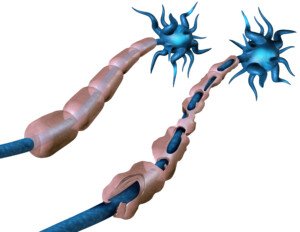
Both multiple sclerosis and carpal tunnel syndrome can cause tingling in the fingers.
However, the tingling of MS is more likely to occur in the forearm when it’s in an upper extremity. But carpal tunnel syndrome can also cause some tingling in the forearm.
Another commonality with the tingling in MS and carpal tunnel syndrome is that this symptom can come and go.
“Multiple sclerosis is caused by the immune system attacking the myelin surrounding nerves in brain and spinal cord,” says John-Paul H. Rue, MD, orthopedic sports medicine surgeon with Orthopedics and Joint Replacement at Mercy Medical Center in Baltimore, MD.

Multiple Sclerosis. Shutterstock/Lightspring
Carpal tunnel syndrome has a completely different cause: pressure on the median nerve that runs through the wrist. There is no disease process; the problem is structural.
“Like carpal tunnel syndrome, it [MS] may present with pain, burning and numbness in the hands, but may also present with lower limb symptoms,” says Dr. Rue.
“A thorough neurological examination can help differentiate between these conditions, but there can be overlapping of symptoms as well.”
With CTS, the symptoms will be limited to the hand and may also affect the forearm.
With MS, symptoms, in addition to the tingling in the fingers, hand or forearm, will usually present with other issues in the early stages such as:
• Double or blurred vision
• Clumsiness
• Loss of balance
• Weakness in an arm or leg
CTS will not cause weakness in an arm, though the arm may hurt and feel numb or tingly, even burning.

Freepik.com jcomp
The general rule is that multiple sclerosis will eventually cause more troublesome symptoms; it won’t just sit stabilized in the form of tingly fingers.
Carpal tunnel syndrome will remain confined to the hand, fingers and possibly arm, and almost always includes wrist pain.
Sitting at home wondering “which disease” you have could cause great anxiety.
You should just end the guesswork and insomnia and see a neurologist.
There are tests that will conclusively determine whether any tingling in your fingers might be from carpal tunnel syndrome or from multiple sclerosis.
 Dr. Rue specializes in prevention and treatment of sports and exercise injuries. His primary focuses are knee, shoulder and elbow injuries including ACL and cartilage injuries, rotator cuff injuries and overuse tendonitis.
Dr. Rue specializes in prevention and treatment of sports and exercise injuries. His primary focuses are knee, shoulder and elbow injuries including ACL and cartilage injuries, rotator cuff injuries and overuse tendonitis.
 Lorra Garrick has been covering medical, fitness and cybersecurity topics for many years, having written thousands of articles for print magazines and websites, including as a ghostwriter. She’s also a former ACE-certified personal trainer.
Lorra Garrick has been covering medical, fitness and cybersecurity topics for many years, having written thousands of articles for print magazines and websites, including as a ghostwriter. She’s also a former ACE-certified personal trainer.
.









































